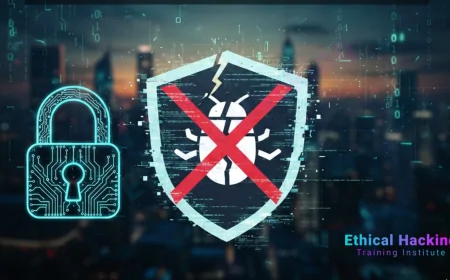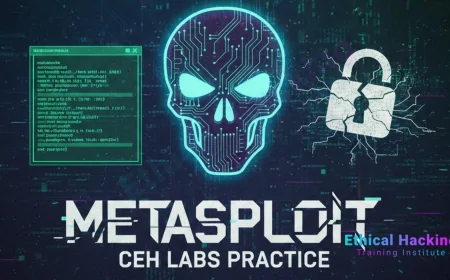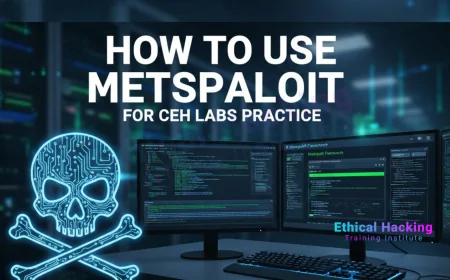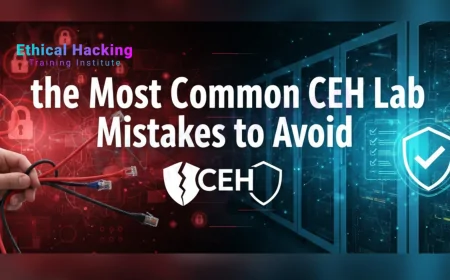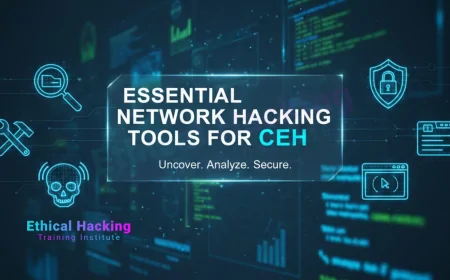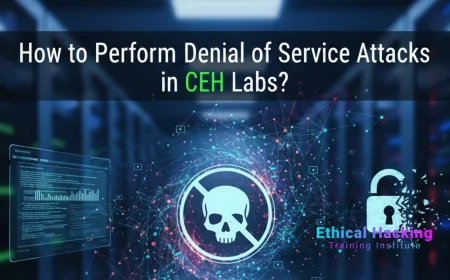Certified Ethical Hacker Program: How to Enroll and What You’ll Learn | How to Enroll in the CEH Program and What You'll Learn Along the Way
Explore the Certified Ethical Hacker (CEH) program—how to enroll, detailed curriculum, hands‑on labs, study paths, and what you'll learn to become a top ethical hacker.
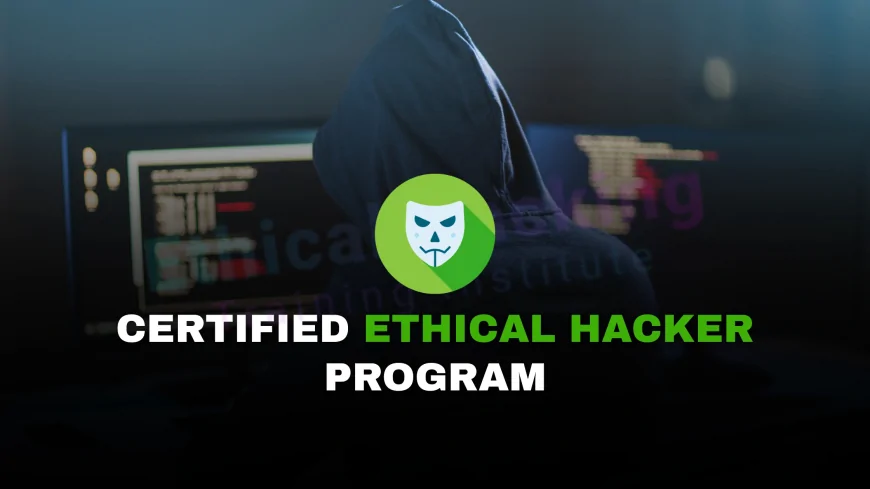
Table of Contents
- Introduction
- Enrollment & Eligibility
- Delivery Options & Pricing
- Program Structure & Modules
- Labs & Practical Training
- AI Enhancements in CEH v13
- Exam & CEH Master Path
- Certification Value & Career Impact
- FAQs
- Conclusion
Introduction
The Certified Ethical Hacker (CEH) Program is one of the most recognized and respected credentials in the field of cybersecurity. Offered by the EC-Council, this program is designed for individuals who want to understand and apply hacking techniques ethically—to detect, prevent, and respond to cyber threats before malicious hackers can exploit vulnerabilities. Whether you’re a beginner looking to start a career in ethical hacking or a cybersecurity professional aiming to validate your skills, the CEH certification is a powerful stepping stone.
This article provides a comprehensive guide on how to enroll in the CEH program, what prerequisites you need (if any), and what skills you will develop throughout the course. From reconnaissance and system hacking to cloud security, malware analysis, and even AI-driven attack methods in CEH v13, the curriculum is built to meet current industry demands.
You’ll also learn about training delivery options (on-demand, instructor-led, and hybrid), hands-on lab environments, certification exam details, and how CEH certification impacts your career in roles like Penetration Tester, Security Analyst, Red Teamer, and more. If you're ready to future-proof your skills and become a certified cyber warrior, this guide will walk you through every essential detail.
Enrollment & Eligibility
Enrolling in the Certified Ethical Hacker (CEH) program is straightforward and inclusive, offering multiple pathways to accommodate both newcomers and seasoned professionals in the cybersecurity field. The EC-Council has defined clear eligibility routes to ensure learners from different backgrounds can access the program based on their experience level.
Option 1: Enroll Through Accredited Training
This is the most common and beginner-friendly path. If you register for CEH training via an EC-Council Accredited Training Center (ATC)—online or offline—you do not need to demonstrate prior work experience or submit eligibility documentation. This route is ideal for students, career changers, and tech enthusiasts who want structured learning and official support.
Option 2: Self-Study with Work Experience
If you prefer self-study or want to avoid formal training, you can still apply for the CEH exam. However, you must meet these criteria:
- Have at least two years of documented work experience in the Information Security domain.
- Submit an eligibility application (non-refundable fee required) with verifiable references.
- Receive approval from EC-Council before scheduling your exam.
This route suits experienced IT professionals, security consultants, or system administrators looking to validate their skills without attending official courses.
Academic and Military Programs
Students enrolled in cybersecurity degree programs or individuals affiliated with military/government training may also be eligible under special pricing and fast-track enrollment processes, often bundled with iLabs access and exam vouchers.
Age Requirement
Participants must be at least 18 years old to take the CEH exam. Minors may be allowed under parental consent and institutional supervision, depending on jurisdictional policies.
International Availability
The CEH program is available globally through EC-Council's network of ATCs, authorized partners, and online platforms. Whether you're in India, the U.S., Europe, or the Middle East, you can register for the course via localized options or directly through EC-Council’s official website.
Delivery Options & Pricing
CEH offers flexible delivery formats:
- On-Demand: Self-paced online course starting at around US $1,699.
- Live Online: Instructor-led virtual classrooms at approximately US $2,499.
- Unlimited On-Demand: All-access subscription at US $3,499.
Program Structure & Modules
The CEH program comprises 20 modules covering over 550 attack techniques across five phases of ethical hacking:
- Footprinting & Reconnaissance
- Scanning & Enumeration
- System & Network Hacking
- Web & Wireless Exploits
- Malware, Social Engineering, Cloud, IoT & Cryptography
These modules reflect the syllabus structure.
Labs & Practical Training
CEH emphasizes hands-on learning, offering:
- Over 220 labs in the cloud-based iLabs environment.
- Realistic attack targets, operating systems, tools, and networks.
- Code-breaking challenges with increasing difficulty.
AI Enhancements in CEH v13
The release of CEH v13 marks a significant evolution in ethical hacking education, introducing AI-powered cybersecurity tools and techniques to address modern threats. As artificial intelligence reshapes the cybersecurity landscape, ethical hackers must learn to both leverage and defend against AI-driven attacks.
What’s New with AI in CEH v13?
EC-Council has updated its curriculum to integrate the influence of AI on cyberattack methodologies. Learners are now exposed to machine learning–assisted exploits, behavior prediction models, and tools that automate reconnaissance, vulnerability discovery, and exploitation.
- AI-Based Reconnaissance: Use of AI to scan and profile networks faster with advanced decision-making capabilities.
- Adaptive Malware Detection: Understanding how attackers use AI to bypass traditional antivirus through polymorphic code and signature evasion.
- AI-Driven Phishing Attacks: Simulated labs showing how natural language processing is used to generate realistic phishing content.
- Deepfakes and Social Engineering: Training on how AI-generated media and deepfake videos pose new threats in social engineering campaigns.
Defensive Applications of AI
CEH v13 not only teaches how AI is used offensively but also emphasizes its defensive potential in building smart detection and prevention systems.
- Understanding AI-powered intrusion detection systems (IDS) and security information and event management (SIEM)
- Integrating behavior-based threat analysis using machine learning models
- Hands-on labs with AI-powered threat hunting tools
Why AI Matters in Cybersecurity Today
Cybersecurity professionals now face AI-enhanced threats that evolve faster than ever before. CEH v13 prepares ethical hackers to stay ahead by using the same AI logic, data models, and automation that modern cyber adversaries employ. This ensures that CEH-certified professionals remain effective and competitive in both red teaming and blue teaming environments.
By incorporating AI into its syllabus, CEH v13 doesn’t just update its content—it redefines what it means to be an ethical hacker in an AI-powered world.
Exam & CEH Master Path
The CEH certification process includes both a theory-based multiple-choice exam and an optional, advanced practical exam. Together, they form a comprehensive assessment path for those aiming to become not just certified ethical hackers—but Certified Ethical Hacker Masters.
CEH Exam Overview
- Exam Code: 312-50 (ANSI Accredited)
- Format: Multiple Choice Questions (MCQs)
- Number of Questions: 125
- Duration: 4 hours
- Passing Score: 60% to 85%, depending on the difficulty form
- Delivery: Pearson VUE test centers or EC-Council Exam Portal (ECC Exam)
This exam covers five major domains, including reconnaissance, scanning, gaining access, maintaining access, and covering tracks, among others. The questions are designed to assess both theoretical understanding and applied knowledge of real-world hacking tools and techniques.
CEH Practical Exam
To validate your hands-on skills, EC-Council offers an optional CEH Practical Exam. This exam is conducted in a live, cloud-based environment simulating real networks, applications, and operating systems. It tests your ability to identify and exploit vulnerabilities across multiple attack surfaces.
- Duration: 6 hours
- Environment: EC-Council iLabs cyber range
- Tasks: 20 practical challenges covering Nmap, Metasploit, password cracking, sniffing, web attacks, privilege escalation, and more
- Scoring: Minimum 70% required to pass
CEH Master Credential
Candidates who successfully pass both the theoretical CEH exam and the CEH Practical exam earn the prestigious CEH Master designation. This dual-level certification demonstrates your expertise in ethical hacking through both conceptual and applied competence.
Why Aim for CEH Master?
- Increases your credibility with employers and clients
- Demonstrates real-world hacking capabilities beyond theoretical knowledge
- Qualifies you for more advanced roles and higher salaries
- Prepares you for elite-level certifications like OSCP or LPT (Licensed Penetration Tester)
By pursuing both CEH and CEH Practical, you not only become certified but also industry-validated as someone who can perform real-time penetration testing and vulnerability assessments under pressure. It’s a powerful step toward becoming a red team expert, SOC leader, or penetration testing consultant.
Certification Value & Career Impact
CEH is ANSI/ISO 17024 certified and recognized by U.S. DoD, NICE, and global employers. Professionals gain:
- Core offensive security knowledge
- Practical lab experience
- Enhanced job prospects in roles like Penetration Tester and Security Analyst
- Marketability, with average wages in the US ranging between $80K–120K
FAQs -
1. What prerequisites are needed?
No prerequisites with official training; 2 years InfoSec experience for self-study.
2. How long is the course?
About 5 days (40 hrs), but on‑demand options vary.
3. How much does it cost?
$1,699–$3,499 depending on format.
4. How many modules?
20 modules covering 550+ techniques.
5. What’s the lab count?
Over 220 hands-on labs in iLabs.
6. What’s new in v13?
AI-driven automation and adaptive training.
7. What is CEH Practical?
A six‑hour hands-on exam to earn CEH Master.
8. Is CEH ANSI certified?
Yes—ISO/IEC 17024 accredited.
9. Who recognizes CEH?
U.S. DoD, NICE, global corporations.
10. Can I self-study?
Yes—if you have 2 years relevant experience.
11. Are practice labs included?
Yes—you get full access to iLabs with most packages.
12. What job roles follow CEH?
Penetration Tester, SOC Analyst, Red Team specialist, etc.
13. CEH vs OSCP?
CEH is theory+labs; OSCP is highly practical and exploit-creation focused.
14. How long is certification valid?
Three years, with CPE requirements.
15. Any retake policy?
Retake options depend on EC-Council policy—usually one retake included.
16. Does CEH cover cloud & IoT?
Yes—cloud, IoT, mobile topics are included.
17. Is AI covered?
CEH v13 adds training on AI-based attacks and defense.
18. How do I enroll?
Visit EC-Council’s site or accredited centers to register online or in-person.
19. What tools are taught?
Nmap, Metasploit, Burp Suite, Wireshark, etc.—550+ techniques.
20. Is CEH worth it?
Yes—it’s respected globally and opens doors in cybersecurity roles.
Conclusion
The CEH program provides a structured roadmap to becoming a skilled ethical hacker—from enrolling and learning to hands-on labs and certification. With up-to-date modules, AI enhancements, and virtual training, it prepares you for real-world cybersecurity challenges and career advancement.
What's Your Reaction?
 Like
0
Like
0
 Dislike
0
Dislike
0
 Love
0
Love
0
 Funny
0
Funny
0
 Angry
0
Angry
0
 Sad
0
Sad
0
 Wow
0
Wow
0
